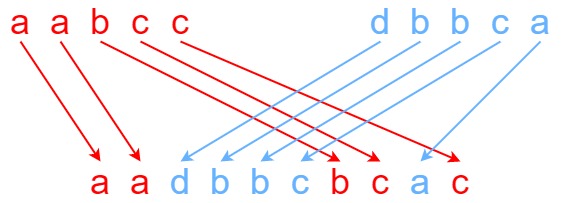LeetCode-in-Go
97. Interleaving String
Medium
Given strings s1, s2, and s3, find whether s3 is formed by an interleaving of s1 and s2.
An interleaving of two strings s and t is a configuration where s and t are divided into n and m non-empty substrings respectively, such that:
s = s1 + s2 + ... + snt = t1 + t2 + ... + tm|n - m| <= 1- The interleaving is
s1 + t1 + s2 + t2 + s3 + t3 + ...ort1 + s1 + t2 + s2 + t3 + s3 + ...
Note: a + b is the concatenation of strings a and b.
Example 1:

Input: s1 = “aabcc”, s2 = “dbbca”, s3 = “aadbbcbcac”
Output: true
Explanation: One way to obtain s3 is: Split s1 into s1 = “aa” + “bc” + “c”, and s2 into s2 = “dbbc” + “a”. Interleaving the two splits, we get “aa” + “dbbc” + “bc” + “a” + “c” = “aadbbcbcac”. Since s3 can be obtained by interleaving s1 and s2, we return true.
Example 2:
Input: s1 = “aabcc”, s2 = “dbbca”, s3 = “aadbbbaccc”
Output: false
Explanation: Notice how it is impossible to interleave s2 with any other string to obtain s3.
Example 3:
Input: s1 = “”, s2 = “”, s3 = “”
Output: true
Constraints:
0 <= s1.length, s2.length <= 1000 <= s3.length <= 200s1,s2, ands3consist of lowercase English letters.
Follow up: Could you solve it using only O(s2.length) additional memory space?
Solution
func isInterleave(s1 string, s2 string, s3 string) bool {
if len(s3) != len(s1)+len(s2) {
return false
}
cache := make([][]*bool, len(s1)+1)
for i := range cache {
cache[i] = make([]*bool, len(s2)+1)
}
return isInterleaveHelper(s1, s2, s3, 0, 0, 0, cache)
}
func isInterleaveHelper(s1, s2, s3 string, i1, i2, i3 int, cache [][]*bool) bool {
if cache[i1][i2] != nil {
return *cache[i1][i2]
}
if i1 == len(s1) && i2 == len(s2) && i3 == len(s3) {
return true
}
result := false
if i1 < len(s1) && s1[i1] == s3[i3] {
result = isInterleaveHelper(s1, s2, s3, i1+1, i2, i3+1, cache)
}
if i2 < len(s2) && s2[i2] == s3[i3] {
result = result || isInterleaveHelper(s1, s2, s3, i1, i2+1, i3+1, cache)
}
cache[i1][i2] = &result
return result
}

